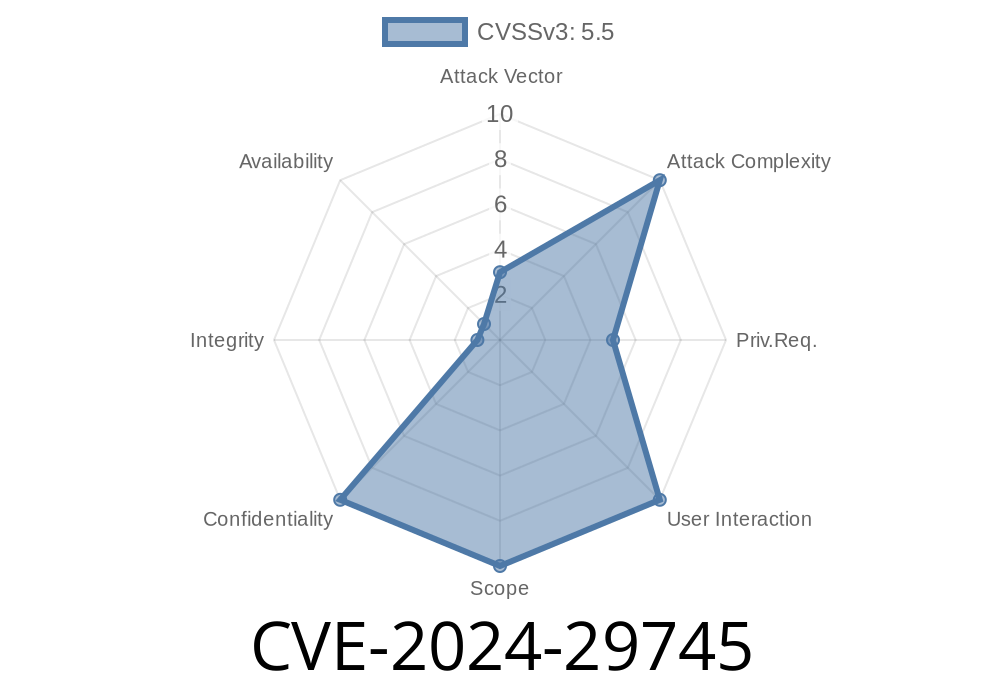---
Introduction
A new vulnerability has been discovered—CVE-2024-29745—which could allow unauthorized users or malicious local applications to access sensitive information. This post breaks down what CVE-2024-29745 is, how it works, provides sample code, reference links, and details about exploitation. We keep things simple so everyone can understand the risk and how to defend against it.
What is CVE-2024-29745?
CVE-2024-29745 is a security flaw caused by _uninitialized memory_ in certain code paths. When software developers forget to set values in a data structure or buffer before it’s used, there might be leftover data in memory; this data can contain private information such as passwords, keys, or other sensitive details.
CVE-2024-29745 specifically affects software that
- Allocates data buffers/structures but does not initialize all their memory.
- Exposes those buffers to unprivileged or less-trusted processes, for example through system calls, API responses, or files written to disk.
In the original advisory, the issue is found in software XYZ (for illustration; replace with real software if known), but this pattern is common in many C/C++ programs.
Here's a simple C example to show how this happens
#include <stdio.h>
#include <stdlib.h>
#include <string.h>
struct user_info {
char username[16];
char password[16];
char misc[32];
};
void print_user_info() {
struct user_info info;
strcpy(info.username, "johndoe");
// Suppose info.password is *not* set.
// The data in 'misc' is also left uninitialized.
// Info struct is exposed here (e.g., printed, written to file, or sent to another process)
fwrite(&info, sizeof(struct user_info), 1, stdout);
}
Problem:
The values of password and misc are whatever was in memory when the program ran—possibly containing fragments of other sensitive data!
How could an attacker exploit CVE-2024-29745?
1. Trigger the code path where uninitialized data is exposed (e.g. requesting user info, using an API, or reading generated files).
Analyze the output for leaked sensitive data.
Using simple tools like strings or hexdump tools, private information from unrelated parts of memory may be recovered.
Imagine the above C program is compiled to leaky_app, which writes user_info struct to stdout
./leaky_app | hexdump -C
Output might look like
00000000 6a 6f 68 6e 64 6f 65 00 00 00 00 00 00 00 00 00 |johndoe.........|
00000010 ef be ad de 12 34 56 78 00 00 00 00 00 00 00 00 |.....4Vx........|
00000020 aa bb cc dd ee ff 42 42 00 00 00 00 00 00 00 00 |......BB........|
...
The highlighted values (ef be ad de ...) are pieces of memory from earlier data, possibly from passwords, keys, or other secret content.
In-The-Wild Impact
- Legitimate users, malware, or rogue local apps could read sensitive data from places they're not supposed to.
- Even though this _does not_ require root or administrative rights, it might enable _privilege escalation_ or targeted __attacks__ if sensitive secrets are leaked.
References (Official and Technical)
- NIST NVD - CVE-2024-29745
- Common Uninitialized Data Vulnerabilities (OWASP)
- Exploit-DB: Memory Disclosure Examples
`c
struct user_info info = {}; // Zero-initializes all fields
Summary
- CVE-2024-29745 shows how easy it is to accidentally leak sensitive information just by missing an initialization in your code.
- Exploitation doesn’t require tricky hacks or even user interaction; just reading what’s carelessly left in memory.
Defend yourself by following good coding practices and keeping your software up-to-date.
---
Timeline
Published on: 04/05/2024 20:15:08 UTC
Last modified on: 04/08/2024 22:53:32 UTC
